 1 citations,
January 2006
1 citations,
January 2006 Hirsutism is mainly caused by high androgen levels or sensitivity, with PCOS being the most common cause.
23 citations,
June 1997 in “Baillière's clinical obstetrics and gynaecology” Most women with too much androgens have PCOS, which can be managed with birth control pills, medication for hair growth, and fertility treatments, and losing weight helps too.
[object Object]  1 citations,
December 1998 in “PubMed”
1 citations,
December 1998 in “PubMed” Surgery on a 68-year-old woman with an ovarian tumor led to reduced hirsutism and normal testosterone levels.
 21 citations,
November 2012 in “Plastic and Reconstructive Surgery”
21 citations,
November 2012 in “Plastic and Reconstructive Surgery” Both genetic and lifestyle factors significantly affect female hair loss.
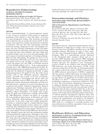 April 2020 in “Journal of the Endocrine Society”
April 2020 in “Journal of the Endocrine Society” A woman's severe hirsutism was caused by Leydig cell tumors in her ovaries, which improved after surgery.
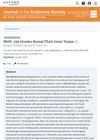 April 2019 in “Journal of the Endocrine Society”
April 2019 in “Journal of the Endocrine Society” A woman's severe male-like symptoms were caused by a rare, benign tumor in her ovary that produced male hormones.
 January 2009 in “Elsevier eBooks”
January 2009 in “Elsevier eBooks” Some plant-based treatments may help with ovary function, insulin resistance, and excess male hormones in PCOS, but more research is needed to confirm their safety and effectiveness.
Hirsutism, often caused by PCOS, is treated with medication and weight loss is important for obese women with PCOS.
 46 citations,
July 1988 in “Journal of The American Academy of Dermatology”
46 citations,
July 1988 in “Journal of The American Academy of Dermatology” Hormone imbalances can cause specific skin changes, which may help in early detection of endocrine disorders.
 5 citations,
March 2015 in “Women's Health”
5 citations,
March 2015 in “Women's Health” The document concludes that diagnosing PCOS requires a thorough approach, considering various symptoms and risks, and calls for improved methods to identify PCOS types and prevent diabetes.
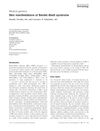 4 citations,
October 2011 in “International Journal of Dermatology”
4 citations,
October 2011 in “International Journal of Dermatology” Bardet-Biedl syndrome may include under-recognized skin problems related to its metabolic disturbances.
[object Object]  70 citations,
January 2000 in “Hormone Research in Paediatrics”
70 citations,
January 2000 in “Hormone Research in Paediatrics” SAHA syndrome is a condition in women involving skin and hair issues, often related to hormonal imbalances, and is treated based on the underlying cause.
 October 2013 in “Springer eBooks”
October 2013 in “Springer eBooks” PCOS is a hormonal disorder causing infertility and menstrual problems, often linked to obesity and can lead to acne, treated with hormonal and insulin-sensitizing medications.
 2 citations,
July 2012 in “Journal of Pediatric and Adolescent Gynecology”
2 citations,
July 2012 in “Journal of Pediatric and Adolescent Gynecology” A 12-year-old girl with very high testosterone and insulin resistance improved with birth control pills, suggesting PCOS can cause high testosterone without tumors.
 3 citations,
May 2023 in “Biomedicines”
3 citations,
May 2023 in “Biomedicines” PCOS causes infertility mainly due to hormonal imbalances, insulin resistance, and chronic inflammation.
 73 citations,
June 2008 in “The Journal of Clinical Endocrinology and Metabolism”
73 citations,
June 2008 in “The Journal of Clinical Endocrinology and Metabolism” Polycystic ovarian shape is a genetic sign of PCOS and its hormonal and metabolic features can be inherited.
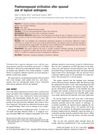 20 citations,
January 2007 in “Fertility and Sterility”
20 citations,
January 2007 in “Fertility and Sterility” A woman developed male traits from accidental contact with her husband's testosterone gel.
 19 citations,
November 2012 in “Journal of Dermatological Treatment”
19 citations,
November 2012 in “Journal of Dermatological Treatment” Isotretinoin improves severe acne without changing androgen or insulin levels but may increase body weight and triglycerides.
 10 citations,
November 2018 in “Physiological Research”
10 citations,
November 2018 in “Physiological Research” The conclusion is that standardizing testosterone measurement methods is essential for better diagnosis accuracy in women.
 9 citations,
September 2015 in “Reproductive Biomedicine Online”
9 citations,
September 2015 in “Reproductive Biomedicine Online” Longer GGN repeats in the androgen receptor gene are linked to polycystic ovary syndrome.
 9 citations,
May 2012 in “British Journal of Dermatology”
9 citations,
May 2012 in “British Journal of Dermatology” Reversing female hair loss.
 9 citations,
January 2007 in “Endocrine Practice”
9 citations,
January 2007 in “Endocrine Practice” A woman's male-like symptoms and high testosterone were due to ovarian hilus-cell hyperplasia, which improved after surgery.
 September 2022 in “Curēus”
September 2022 in “Curēus” The removed ovarian tumor was a rare type of blood vessel tumor that improved the patient's symptoms and hormone levels after surgery.
 93 citations,
June 2001 in “The Journal of Clinical Endocrinology and Metabolism”
93 citations,
June 2001 in “The Journal of Clinical Endocrinology and Metabolism” Certain genetic variations in the AR and ERβ genes can affect androgen levels in women.
 63 citations,
March 2011 in “Clinical Endocrinology”
63 citations,
March 2011 in “Clinical Endocrinology” Evaluate postmenopausal women with high androgen levels using medical history, physical exams, lab tests, and imaging to manage health risks.
 56 citations,
October 2018 in “Journal of The American Academy of Dermatology”
56 citations,
October 2018 in “Journal of The American Academy of Dermatology” Androgens play a complex role in skin conditions like acne and hair loss in women, and normal blood levels don't always show true androgen status.
 48 citations,
February 2008 in “Nutrition in Clinical Practice”
48 citations,
February 2008 in “Nutrition in Clinical Practice” Dietary changes, including weight loss and a balanced diet, are important for managing PCOS, especially in overweight women.
 32 citations,
March 2019 in “Climacteric”
32 citations,
March 2019 in “Climacteric” Premature ovarian insufficiency (POI) can harm women's sexual health, and they may benefit from hormone therapy and counseling.
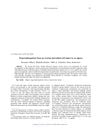 11 citations,
November 2006 in “Journal of Veterinary Diagnostic Investigation”
11 citations,
November 2006 in “Journal of Veterinary Diagnostic Investigation” An alpaca acted like a male and couldn't have babies because of a benign tumor in its ovary that caused high testosterone levels.
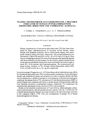 6 citations,
November 1980 in “Clinical Endocrinology”
6 citations,
November 1980 in “Clinical Endocrinology” Measuring plasma testosterone glucosiduronate is a reliable way to detect high male hormone levels in women.




























